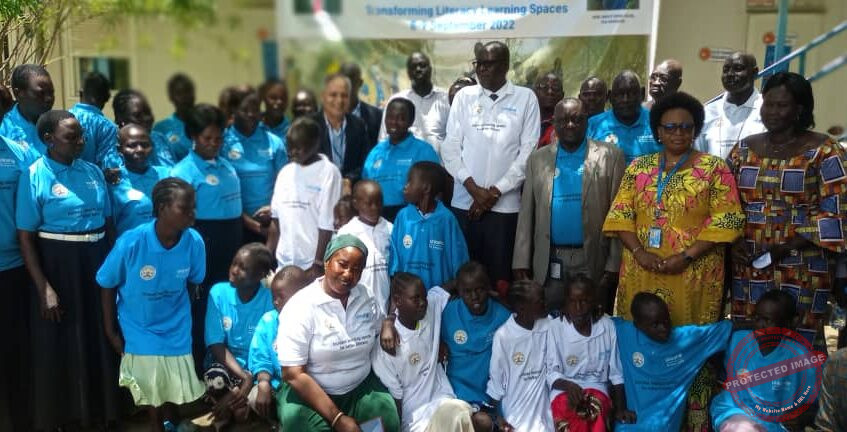
School children, parents and stakeholders commemorated World Literacy Day in Juba. | (Photo: Moyo Jacob/Eye Radio.)
South Sudan literacy rate may not have improved much in the last three years due to multiple challenges the country has been entangled in, says UN’s children agency UNICEF on Thursday.
The agency’s Education Officer, Christophe Morgan doubts any significant change in the country’s literacy figure over the past three years.
He presumed that the stagnating statistics could be as a result of multiple crisis that have engulfed the country, including conflicts, floods, impact of Covid-19 and economic crisis.
Speaking to Eye Radio on the World Literacy Day, the aid worker said estimates of the country’s literacy rate are apparently between 27-30 as in 2019.
“You know we are celebrating as South Sudan at the small percentage which could be 27 to 30 percent because in 2019 the literacy rate of south Sudan was 27 and of we take 2019 plus Covid-19,” he said.
The latest statistic from World Population Review ranks South Sudan as the third lowest in literacy rate in world, with the 34.54% benchmark. This means only that percentage of the adult population can read and write.
In front of South Sudan, are Chad and Guinea, two of the least educated in the world with 22.31% and 32.0% respectively.
However, the country is followed by Niger, Mali and Central African Republic among score of other African countries and Afghanistan.
To combat the problem, authorities have launched thousands of adult education classes across the country.
But the effect of nearly a decade of civil war has eroded progress in the education sector, as study by the Faculty Digital Archives showed that schools located in the South Sudanese war zones lose at least 18.5 percent of total enrollment every year.
According to UNICEF, more than 2.8 million children, or over 70 per cent, are out of school in South Sudan, putting at risk their futures and the future of the country.
While speaking to Eye Radio on Thursday, Morgan called on the government and its development agencies to strive for a better result in the next five years.
He suggested more efforts be exerted in formal education and adult literacy in order to push up the trajectory.
“We will not say we are at 40 percent, but we urge the government, UN and NGOs to up push South Sudan at least in the next five years at least to margin of 50 percent of adult being able to read.”
The humanitarian said the progress can be achieved through formal education and functional adult literacy.
Experts have defined literacy as the ability of an individual to read, write and speak effectively, as well as make sense of the world around them.
The International Literacy Day is celebrated each year on September 8th, aimed at creating awareness on meaning and importance of literacy for individuals and societies.
This year’s theme is “Transforming Literacy Learning Spaces; Exploring Opportunities and Possibilities.”
Support Eye Radio, the first independent radio broadcaster of news, information & entertainment in South Sudan.
Make a monthly or a one off contribution.
Copyright 2024. All rights reserved. Eye Radio is a product of Eye Media Limited.